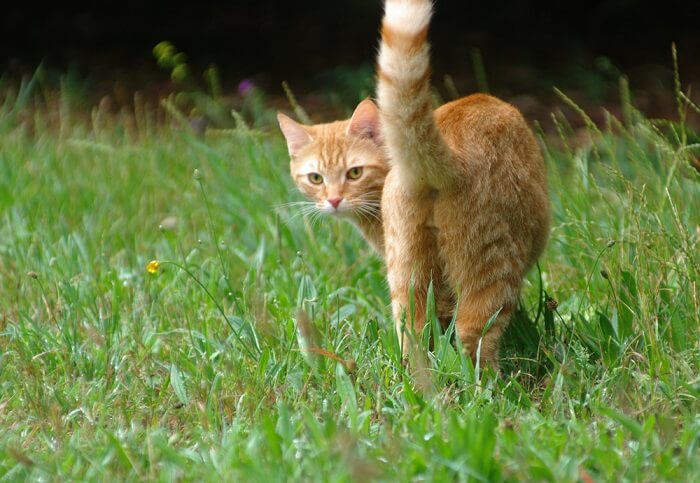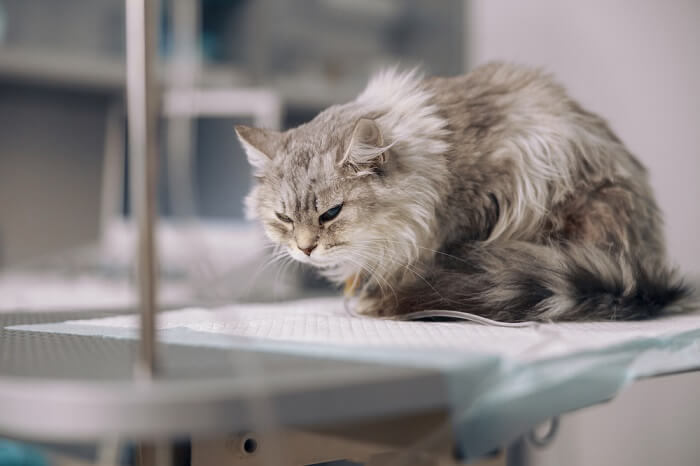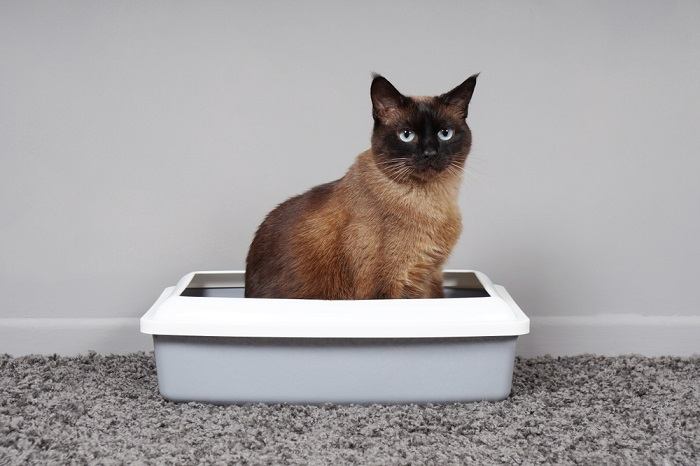
“Leaky gut syndrome” is a term used to describe a condition where the wall of the intestine is more permeable than it should be.
The lining of the intestinal wall is an important barrier. In healthy cats, this barrier allows nutrients and healthy bacteria to be absorbed from food, but prevents substances like “bad” bacteria, toxins and allergens from passing through into the bloodstream.
If this lining becomes damaged or inflamed, the barrier can become “leaky,” meaning those unwanted substances may be able to pass through.
Some people think that a wide array of symptoms and conditions could be caused by the immune system reacting to these unwanted substances leaking through the intestinal wall.
However, whilst we know that certain diseases and medications can cause an increase in intestinal permeability, there is little evidence to support the existence of “leaky gut syndrome” in either people or animals. Currently, leaky gut syndrome is not recognized as a distinct medical condition in human or animal healthcare.
Although the science around leaky gut syndrome as a disease is still unclear, we know that maintaining a healthy gut is a important part of keeping our cats happy and healthy. This article will explore the latest thinking on leaky gut syndrome, and how we can help keep our cat’s guts healthy.
What Are the Causes of Leaky Gut Syndrome in Cats?
We know that certain drugs (such as non-steroidal anti-inflammatories and corticosteroids) and certain conditions (such as inflammatory bowel disease, gastrointestinal infections, and severe food allergies and intolerances) can damage the lining of the digestive tract.
However, proponents of leaky gut syndrome think a much wider range of causes could be involved, including:
- Imbalance in the bacteria and microorganisms found in the gut (called dysbiosis)
- Poor or inappropriate diet
- Nutritional deficiencies
- Over-use of antibiotics causing bacterial imbalances
- Exposure to toxins, preservatives and chemicals such as pesticides
- Stress
What Are the Signs of Leaky Gut Syndrome in Cats?

Leaky gut syndrome is not currently recognized as a distinct medical condition in animals.
The science is still very much up in the air as to whether leaky gut syndrome directly causes of any significant diseases. But some people believe it may play a part in a wide range of symptoms, most commonly affecting your cat’s gastrointestinal system. These include:
- Bloating
- Reduced appetite
- Diarrhea
- Weight loss
- Flatulence
- Abdominal pain or cramps
If your cat is suffering from any of these symptoms it is important that you make an appointment to visit your veterinarian, and do not attempt to treat your cat at home.
What Diseases Are Linked To Leaky Gut Syndrome?
We know that increased intestinal permeability is seen in inflammatory and ulcerative conditions affecting the digestive tract in cats, such as inflammatory bowel disease and some severe food allergies.
However, some people believe that leaky gut syndrome could be a factor in a whole range of health problems outside of the gastrointestinal tract in people and animals. These include liver disease, joint disease, heart and lung disease, epilepsy, pancreatitis, chronic fatigue syndrome and even mental health disorders.
It is important to note that many of these associations are backed up by little or no evidence in either people or animals.
How Do You Diagnose Leaky Gut Syndrome in Cats?
There is no way to diagnose leaky gut syndrome in either people or animals. However, if your cat is suffering from gastrointestinal symptoms, there is a range of tests your veterinarian can perform to assess their overall health, and the health of their gut.
Tests your veterinarian might want to perform may include:
- A thorough physical examination and assessment of body condition score
- Fecal sample to screen for parasites and infections
- Comprehensive screening blood tests
- Additional tests specific to the gastrointestinal system (this may include TLI, folate and cobalamin)
- Imaging of your cat’s abdomen with x-rays or ultrasound
- Biopsies of their gastrointestinal tract
How Do You Treat Leaky Gut Syndrome in Cats?
Treatment of leaky gut syndrome aims to reduce intestinal inflammation and restore the balance of healthy bacteria in the gut.
Assess Your Cat’s Diet
Firstly, it is important to ensure your cat is on a high-quality, balanced pet food. If a food allergy is suspected, your veterinarian may recommend a veterinarian-directed food trial using a hypoallergenic food. If a food allergy is identified, it is important to remove this from your cat’s diet.
Support a Healthy Microbiome
Probiotics can be useful in supporting gut health and promoting a healthy balance of bacteria in the gut which is vital for your cat’s overall health. This is important for all cats, but especially those suffering with conditions such as inflammatory bowel disease, chronic kidney disease, and immune-related conditions such as allergies. Probiotics are especially useful if your cat has been prescribed antibiotics, as they help rebuild the population of good bacteria that can be damaged by antibiotic use.
For advice on choosing the best probiotic for your cat, check out this 2022 review. Other supplements that may be helpful include omega-3 fatty acids, fiber supplements, digestive enzymes, multivitamins and antioxidants. Always talk to your veterinarian before starting your cat on any new supplement or vitamin.
In cats with severe gut health issues, your veterinarian may recommend a treatment called fecal microbiota transplantation (FMT). Fecal transplantation is the transfer of feces (which contain a population of good bacteria and microorganisms) from a healthy donor cat into the digestive system of the affected cat—yes, literally putting poo from one cat into another!
Discontinue Certain Medications
Finally, if your cat began suffering from digestive problems after starting a new medication, such as non-steroidal anti-inflammatories, this may need to be stopped and an alternative treatment used. Your veterinarian will be able to discuss a treatment plan that balances all your cat’s health needs.
How Do We Prevent Leaky Gut Syndrome in Cats?

There is still a huge amount we don’t know about leaky gut syndrome, so it is difficult to know how to prevent it. However, there are a number of steps you can take to help your cat’s gut stay healthy:
- Choose a high-quality, balanced pet food
- Avoid over-use or inappropriate use of antibiotics
- Consider using probiotics
- Maintain your cat at a healthy weight
- Encourage plenty of exercise
Conclusion
The scientific community is still divided as to whether leaky gut syndrome exists as a distinct medical condition in either people or animals, and it is currently not recognized in human medicine.
However, we know for certain that gut health plays a vital role in how our bodies function, and so preserving and promoting a healthy gut is vital for overall pet health. So, whilst leaky gut syndrome is not currently a condition that can be diagnosed, taking care of our cat’s gut health should be a priority for all cat owners and veterinarians.
Frequently Asked Questions:
How do you treat leaky gut in cats?
As leaky gut syndrome is not a recognized medical condition, there are no widely recognized treatments. However, feeding a balanced diet, removing known allergens, and using probiotics are all known to support gut health in cats.
What are the first symptoms of leaky gut?
Leaky gut syndrome is commonly associated with symptoms of the gastrointestinal tract, including flatulence, diarrhea, vomiting, weight loss, bloating and cramps. Some people believe it may also play a role in a wide range of other symptoms and diseases from joint pain to liver disease, heart and lung disease, immune conditions, and even mental health disorders in people. However, there is little to no evidence to support many of these claims.
What happens to animals with leaky gut?
In animals with leaky gut syndrome, the intestinal wall is more permeable than it should be. This means that undigested food, toxins and "bad" bacteria may be able to cross the intestinal wall and enter the blood stream. Some people believe this may trigger an immune reaction in the body that could be responsible for a whole range of symptoms and conditions from gastrointestinal signs such as diarrhea and bloating, to conditions outside of the gastrointestinal system.
However, there is little evidence to support this theory, and currently leaky gut syndrome is not recognized as a distinct medical condition in people or animals.
Can leaky gut be corrected?
As leaky gut syndrome cannot be diagnosed, it is difficult to assess whether treatments for leaky gut syndrome are effective. However, we do know that a healthy diet, removing known allergens, and using probiotics can all help support a healthy intestinal wall and a healthy population of gut bacteria.
-
Camilleri M. Leaky gut: mechanisms, measurement and clinical implications in humans. Gut 2019;68:1516-1526. https://gut.bmj.com/content/68/8/1516







